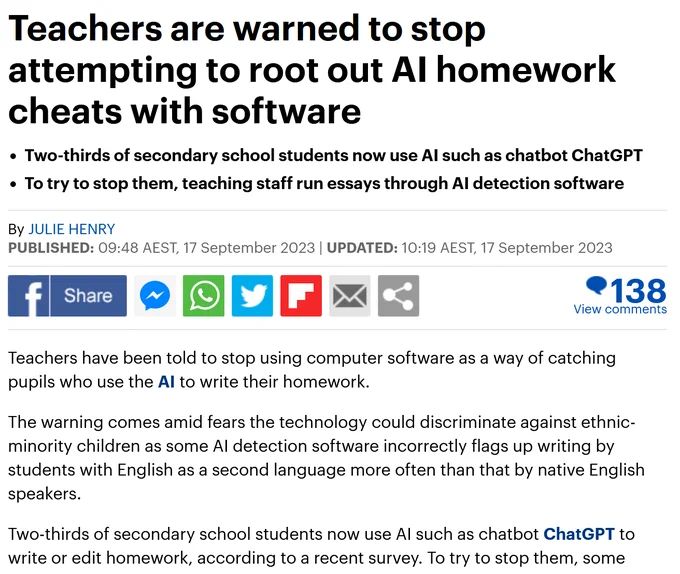Teachers and Parents Around the World Change Their Minds about ChatGPT and Assisting Students in Properly Adopting It


In Brief
Educators and parents worldwide are experiencing a shift in perspective when it comes to ChatGPT, as they actively encourage students to utilize it effectively in their studies.
Teachers and parents are reconsidering their position on AI-driven tools like ChatGPT in a world where technological advancements in education are having a greater impact on the educational landscape. This change in viewpoint is a result of a growing understanding of the useful advantages and ChatGPT’s potential to improve students’ writing abilities.

One high school educator’s experience serves as a compelling example of this evolving mindset. In their classroom, they have harnessed the power of AI and ChatGPT to facilitate improvements in their students’ writing abilities. Rather than imposing rigid constraints on its use, they have chosen to adopt a more open and instructive approach.
THIS! ⬇️⬇️
— Holly Clark – The AI Infused Classroom (@HollyClarkEdu) September 19, 2023
A high school teacher explains why trying to “catch” students using AI was not going to work for her and what she did instead! #chatgpt pic.twitter.com/LDThB2XfHd
This educator has introduced their students to ChatGPT, emphasizing the importance of ethical and effective utilization of the tool. Discussions on potential biases within AI models and their ongoing development have been an integral part of the classroom dialogue.
As a result of this approach, the educator has witnessed a diverse range of responses from their students. Some have eagerly embraced the tool, leveraging it to refine their writing skills. They have learned to construct better prompts, allowing them to harness ChatGPT’s capabilities more effectively. These students have demonstrated an ability to rework problematic sentences and have openly shared their experiences in Google Classroom.
One notable instance involved a student who submitted both their original work and the version generated by ChatGPT. This led to a constructive discussion about the tool’s role in improving their writing. Such open conversations have been an unforeseen yet encouraging outcome of the integration of AI in the classroom.
| Related: America’s education system is in dire need of 300k teachers — but ChatGPT could be the answer |
The educator acknowledges that while AI can assist students in certain aspects of writing, it still grapples with the challenge of seamlessly connecting evidence to argumentation. To address this, they plan to allocate points in the final essay assessment to incentivize students to engage more deeply with ChatGPT, ultimately fostering the development of robust arguments.
This educator seeks feedback on their AI integration efforts and acknowledges the varying policies in place across different educational districts. They express gratitude for the support and encouragement received from colleagues as they continue their journey to enhance students’ writing skills through the responsible use of AI.
At MIT, teachers mandated the use of ChatGPT to correct grammar before posting essays, preventing confusion among students. However, some schools continue to ban ChatGPT, despite its potential benefits in enhancing academic writing. This discrepancy arises from concerns about overreliance on AI tools and the potential for students to rely solely on ChatGPT for their writing needs. While it is important to address these concerns, it is equally crucial to recognize the value that ChatGPT brings in providing immediate feedback and improving writing skills in real-time.
At MIT, our teachers required that we use chatGPT.
— Sarah Chieng (@SarahChieng) September 13, 2023
ex: our Chinese teacher told us to use chatGPT to correct our grammar before posting our essays for other students to read. She didn't want any incorrect grammar to confuse other students.
Why are schools still banning…
Also, some parents believe that teachers are misguided in denying the use of AI, such as ChatGPT, for their students’ assignments, as AI can significantly increase income and productivity. The speaker argues that teachers should embrace the use of AI, like ChatGPT, as it can provide students with valuable insights and resources that may not be readily available in traditional classroom settings. Furthermore, integrating AI into assignments can help students develop critical thinking skills by encouraging them to analyse and evaluate the information generated by AI systems.
I think that it's nonsense that my kids' teachers say that they can't use AI, like chat gpt, on their assignments. I think that chat gpt is going to be available for a long time. People can make so much money by using AI. pic.twitter.com/u1C1RrBtf3
— Abraham Gray (@TheAbrahamGray) September 17, 2023
The AI-created assessment results provided valuable insights into students’ progress and helped teachers identify areas of improvement. This data-driven approach allowed educators to tailor their instruction and interventions more effectively, ensuring that each student’s individual needs were addressed.
Day 2 of our three day series on the relationship of #CHATGPT and #WICOR. Teachers took the results from assessment creation using AI and analyzed to the rigor of the targets! #WPSProud #PVMSProud@TiaMaRena pic.twitter.com/7pBMs28dPE
— Ally Martin (@mrsmartin70) September 20, 2023
ChatGPT and Racism Scandal
Australian and UK college students cheat on assignments using ChatGPT, leading to accusations of ‘racism’ when teachers use software to catch cheating, highlighting the complexity of education.
The education system has been crumbling due to activism, poor teacher quality, and an over-reliance on technology. Students are slipping down globally and are incapable of performing basic tasks in young adulthood. Cheating has become more prevalent in 2023, with students using AI bots like ChatGPT to cheat on assignments and exams. Teachers are concerned about the large amounts of students using ChatGPT to cheat, as it is the laziest pathway through education in history.

Australia has a serious problem with ChatGPT, but a shocking two-thirds of UK children are thought to be cheating in this way. Good teachers understand this harms the children more than anyone and have been using software to detect ChatGPT content just as they used to use software to catch plagiarists. In the UK, teachers have been told to stop trying to police ChatGPT in their classrooms because it may be considered racist.
The explanation for this absurdity is that the software used to detect ChatGPT cheating might “flag” children of an ethnic minority background more often than native English speakers. However, there is no proof of this, and the writing skills of native speakers have fallen so low that a study should be performed to see if there really is a difference.
The real fear is that if cheating is stopped, a true picture of the terrible education standards will be revealed. If two-thirds of students are cheating, they are unable to perform the task and have no interest in their own education. Lazy adults, who should know better, are routinely employing the AI chatbot to write emails, draft meeting responses, and produce articles.
Prevent Cheating in Education
To prevent industrial levels of cheating, it is suggested that computers be removed and students complete essays in the classroom with books, instead of using supervised essay writing. This would help identify which kids are struggling and which are cheating. The education system will never approve of this, as it would show parents how badly modern education has failed their kids.
Teachers are advised to approach the issue of student cheating with ChatGPT in a manner that avoids racial bias and potential negative outcomes. Rather than perpetuating stereotypes or causing gaps in education, it is suggested that teachers encourage students to engage in handwriting assignments for English lessons. This alternative approach allows teachers to closely monitor individual progress, provide personalized feedback, and foster a fair and equal learning environment. By emphasizing the importance of traditional writing methods, students can develop essential cognitive and fine motor skills that extend beyond the realm of English lessons.
AI technologies like ChatGPT are increasingly being used in schools by both students and teachers. OpenAI’s guide, “Teaching with AI,” provides a comprehensive guide on the potential, constraints, and nuances of using ChatGPT in classrooms. However, concerns about academic integrity must also be addressed. AI detectors were initially intended to combat cheating but have been found to be vulnerable against minor changes to AI-generated content and risk of false positives. To effectively integrate AI, a synergy between humans and AI should be created. Curriculums that encourage discussions around AI ethics can equip students with a socially conscious approach to technology. AI’s impact on education systems is significant, and it is essential to consider how AI will continue to shift educational institutions.
Read more related topics:
Disclaimer
In line with the Trust Project guidelines, please note that the information provided on this page is not intended to be and should not be interpreted as legal, tax, investment, financial, or any other form of advice. It is important to only invest what you can afford to lose and to seek independent financial advice if you have any doubts. For further information, we suggest referring to the terms and conditions as well as the help and support pages provided by the issuer or advertiser. MetaversePost is committed to accurate, unbiased reporting, but market conditions are subject to change without notice.
About The Author
Damir is the team leader, product manager, and editor at Metaverse Post, covering topics such as AI/ML, AGI, LLMs, Metaverse, and Web3-related fields. His articles attract a massive audience of over a million users every month. He appears to be an expert with 10 years of experience in SEO and digital marketing. Damir has been mentioned in Mashable, Wired, Cointelegraph, The New Yorker, Inside.com, Entrepreneur, BeInCrypto, and other publications. He travels between the UAE, Turkey, Russia, and the CIS as a digital nomad. Damir earned a bachelor's degree in physics, which he believes has given him the critical thinking skills needed to be successful in the ever-changing landscape of the internet.
More articles

Damir is the team leader, product manager, and editor at Metaverse Post, covering topics such as AI/ML, AGI, LLMs, Metaverse, and Web3-related fields. His articles attract a massive audience of over a million users every month. He appears to be an expert with 10 years of experience in SEO and digital marketing. Damir has been mentioned in Mashable, Wired, Cointelegraph, The New Yorker, Inside.com, Entrepreneur, BeInCrypto, and other publications. He travels between the UAE, Turkey, Russia, and the CIS as a digital nomad. Damir earned a bachelor's degree in physics, which he believes has given him the critical thinking skills needed to be successful in the ever-changing landscape of the internet.



















































